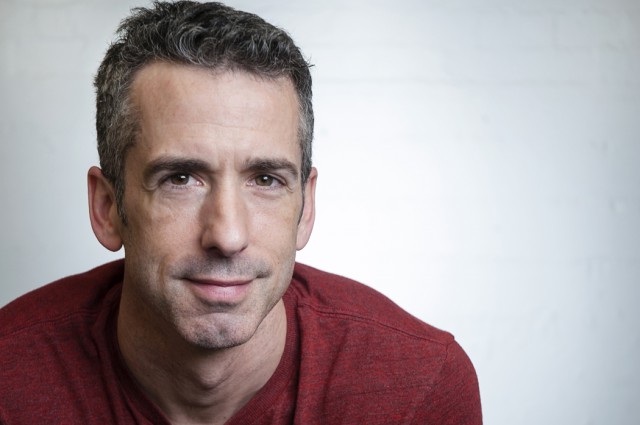
It’s a funny story, how the wiseass gay theater kid at the video store became America’s most trusted and outspoken sex advocate.
Through his sex column, “Savage Love,” Dan Savage has become one of the highest-profile gay figures in the country, a tireless and fearless advocate of a liberalized philosophy on sex and relationships. People think of different sexualities as opposing baseball teams; Savage has been coaching all sides for 22 years now. He’s crass, unapologetic, fearless and wise. He’s what Dr. Ruth would have been had she grown up watching Internet porn.
Savage’s writing career began in Madison, Wis., in 1991. He was working at a video store and became friends with Tim Keck, co-founder of The Onion. Keck told Savage he was starting a newspaper in Seattle — the alternative weekly already there, Seattle Weekly, wasn’t alternative enough. Savage suggested on a whim that Keck include a sex advice column. The rest is history. Savage Love continues to run in The Stranger, and dozens of other newspapers around the country, including this one, to this day.
Savage started his career unabashedly gay — until 1999, every letter began with the opener “Hey Faggot,” in an attempt to reclaim the word — and the concept was “to treat straight sex with the same revulsion that straight advice columnists had always had for gay sex,” Savage told journalist Mark Oppenheimer, who wrote an e-book declaring Savage “the first gay celebrity.” However, this gag was short-lived, since as the column’s popularity grew and grew, it wasn’t just gay people who were writing him letters. Straight people began pouring their hearts out to him too, asking questions not just about the vagaries of butt sex and BDSM but about heart wrenching relationship problems as well.
“When I started writing it, there was no Internet, there was no Google. A lot of the questions I would get, would be, ‘I’ve heard that there’s this thing called a butt plug. What the hell is that?’” Savage tells Boulder Weekly. “And butt plugs literally have a Wiki page now. So, I don’t have to explain to people how a butt plug works.”
Instead, he gets what he classifies as “situational ethics and relationship conflicts,” and what he dishes out these days is as much relationship counseling and sex therapy as it is sex advice.
It’s a trend in his career — there’s something about the wisdom he espouses that appeals to a larger audience than he initially intends. His column is now a paragon of sex-positivity for all genders and sexual orientations on a national level. The It Gets Better campaign he started with his partner of 18 years (and husband of eight), Terry Miller, aimed to help bullied gay youth but quickly snowballed to include bullying victims of all sexual orientations. (The campaign did try to refocus the message back on queer kids.)
What makes his appeal so universal? Perhaps it’s because the type of sexuality he proposes to straight people is more libertine than that which many straight people are told to practice. He believes monogamy in long-term relationships is difficult to the point of being unrealistic, so he often preaches the value of open relationships and the less-promiscuous “monogamish” ones, a term Savage coined a few years ago.
In fact, as Savage has been pointing out recently in interviews, the lifestyle he preaches for straight people is essentially the one gay men have lived for years, the one condemned by Jerry Falwell and his ilk in the late ’70s and early ’80s as the “gay lifestyle.”
“[Straight people] renamed everything,” Savage recently told an audience at the New York Public Library. “Gay people had ‘tricks’; you people have ‘hookups.’ Gay people had ‘fuckbuddies’; you guys have ‘friends with benefits.’ The whole moving to the city, living in an urban area, having an apartment, fucking a lot of people, dating around, and then settling down in your 30s. That period of straight life — post-college, pre-marriage — that … is the gay lifestyle. … And that’s how straight people now live. We are all faggots now in our 20s.”
Despite the unrestrained mouth, Savage is also a throwback in many ways, the rare newspaper editor and columnist who managed to achieve a level of national fame and celebrity. His lifestyle these days — a stable marriage with a kid — is, somewhat counter-intuitively, rather traditional, as Oppenheimer points out.
For all his popularity, Savage is not without critics. He has been accused of bigotry towards transsexuals, bisexuals and women; his staunch backing of the necessity for gay marriage in the ’90s, before the gay community reached a consensus on the need for it, led some gay people to brand him with a scarlet “C” for conservative. Even now, there seems to be some disagreement in the GLBT community as to whether Savage is a good representative for the cause. That criticism, says Jerry Portwood, executive editor of Out magazine, seems to come from the lesser-seen, more conservative wing of the gay community.
“For example, when I’ve posted things or written about things or put things on social media about Dan, often you have straight women defending him and Terry, and often it’s the gay men who are the ones that are more negative and that are attacking them,” Portwood says. “I find interesting that he has this very strong base of straight women who are willing to stand up for him.”
Savage has never shied away from controversy, and he’s never let a fear of consequences stop him from speaking his mind. After Sen. Rick Santorum made remarks comparing homosexuality to pedophilia and bestiality, Savage ran a letter in his column calling for a contest to redefine the Pennsylvania senator’s last name into a sex act of some sort. The winning definition, “The frothy mixture of lube and fecal matter that is sometimes the by-product of anal sex,” morphed into a huge “Google problem” headache for Santorum during his failed presidential run in 2012.
That same year, a group of gay conservatives called GOProud endorsed Mitt Romney for president. Savage tweeted a link to the story with the words, “The GOP’s house faggots grab their ankles right on cue … pathetic.” In April, speaking in front of a gathering of high school journalists, he criticized anti-gay Christians for selectively quoting the Bible. When several students stormed out, Savage remarked, “It’s funny to someone who is on the receiving end of beatings that are justified by the Bible how pansy-ass people react when you push back.” Savage later apologized for using the term “pansy-ass” but stood by his comments about the Bible. But that’s Savage in a nutshell. Perhaps it’s his bravery, his willingness to stick to his guns in a funny yet deathly serious way, that makes him so universally appealing.
Savage was editor of Stranger from 2001 to 2007 before becoming the editorial director, a position he describes as “the queen of England. I’m a consultant and I give advice, which is frequently ignored.” He continues to write his column, which he expanded into a very popular podcast in 2006. He is the author of six books, the most recent of which, American Savage: Insights, Slights, and Fights on Faith, Sex, Love, and Politics, came out May 28. Boulder Weekly talked to Savage about his sexual philosophies, his experience as a gay man in the middle of the AIDS epidemic, and how his column (which can be found at the back of Boulder Weekly) has changed during the past 22 years.
Boulder Weekly: How would you describe your column to a stranger?
Dan Savage: I’ve always described the column as a conversation I’m having at a bar with my friends about sex after we’ve had a few drinks. And people are being sometimes funny, sometimes maudlin, but using the language they actually use when they talk about sex with their friends … or when they’re not drunk. My column is a sex advice column for drunks who are being honest.
I thought I might get your opinions on certain subjects that people might find out of the mainstream. For instance, what’s your take on monogamy?
Ah, I knew you would go there first, just to piss people off.
I’m for monogamy if that’s what a couple wants and that’s what makes a couple happy. I’m for a more realistic attitude towards infidelity and adultery, which, over the multi-decade course of a truly long-term relationship, is likely to touch each and every one. I also think that open relationships work, and “monagamish” relationships work, which is how I describe mine.
People who are in non-monogamous relationships don’t run around saying that people who are monogamous aren’t really in love and aren’t really committed, but often you hear people who are in monogamous relationships saying that people who are in open relationships are not really in love, are not really committed, because they couldn’t do that if they were really in love or if they were really committed. And I think that’s often the monogamy folks projecting their insecurities around infidelity and cheating onto the non-monogamous. It’s not the non-monogamous who are prescriptive.
And the way we talk about monogamy is a problem. People are told growing up that one day they will fall in love and they will make a monogamous commitment, which will be relatively super-easy, because when you’re in love that means you don’t want to have sex with anyone else but that person. The actual fact, with experience plus also a mountain of research and data, shows that if you make a monogamous commitment, you will still want to fuck other people. You will. (Laughs) In a monogamous commitment, what you’re saying to your partner is that “I will refrain from fucking other people. I will still want to.” That actually makes that commitment more meaningful. If monogamy was easy, and people didn’t want to fuck other people when they were in love with someone, then we wouldn’t have to make a commitment not to do that.
What’s the difference between monogamish relationships and open relationships?
You know, it’s difficult when you talk about monogamy and not-monogamy. When you talk about monogamy, that’s one thing, and it’s identical. Everybody who is monogamous is doing the exact same thing: two people who are not fucking anybody else except each other. Open relationships come in so many different flavors. There can be as many different types of agreements and allowances for outside contact as there are open relationships. You may meet someone who says, “I’m in an open relationship,” and what they mean is that “my partner and I rarely and occasionally might have a three-way, once a year. Maybe.” Then you meet people in open relationships who have sex with two or three or four or five or 10 other people every week, who are just out there whoring it up.
Terry and I are gay men — cat outta the bag there, right? When I would say that we are not monogamous, people would presume, because we’re gay men, a degree of promiscuity that made both of us really uncomfortable. Because we are not that promiscuous. But even other gay people would think, “They’re a gay couple, they’re not monogamous, they must be fucking a million people.” And we are so much more monogamous than not. Ninety-nine percent of the time if Terry or I are having sex, it’s Terry and I having sex with each other. To say “not monogamous” when there are these stereotypes about gay men and gay men have so much access to so many willing sex partners — because men are pigs, not just gay men, all men — made us uncomfortable. We’re much more monogamous than not. I was saying that for a long time, and one time I said we’re “monogamish,” which is monogamous with a little squish around the edges.
I’ve had gay men tell me that they think straight people have a very old-fashioned view of relationships and love, for that reason.
Well, you look at the data, and gay male couples are the least likely to be monogamous. Straight couples and lesbian couples are the most likely to be monogamous. Which tells me the problem with monogamy is not gay men, it’s men, period. If you want to make marriage safe for monogamy, you need to ban marriage that involves men at all. Only lesbians should be allowed to marry, if monogamy is what marriage is defined by.
Do you get letters after 22 years that even make you cringe? Or are you totally jaded to anything anyone could ever write you?
I’m pretty jaded. Sometimes I’m shocked how stupid people can be. The letters that break my heart are the people who are 25 or 30 and say “I’ve been reading you for 15 years; I’ve been reading you since I was 14 or 15 years old, and here’s what I did.” And I think, oh my God, you read me, but you didn’t pay attention? Nothing stuck? I’m just sometimes shocked that someone could read me for 15 years and make the same sort of junior varsity mistakes that I would think that 15 years of reading my column would inoculate you to that sort of shit, but apparently not.
One of your more famous concepts is “GGG.” Could you give a quick definition of what that means?
Good, giving and game. Good in bed — you have to work on those skills. A human being is way more complicated than a violin. No one expects to be able to play a violin the first time they pick it up, but everyone thinks they should be really good at this sex shit the first time they give it a bang. Giving, which is that you sometimes give pleasure without an expectation of an immediate return on that. Which is sometimes hard for people to wrap their heads around. You don’t want to be with someone who takes and takes and never reciprocates. But sometimes, you know, you do for your partner. Your partner is horny and you’re not, you help them get off, or you only have time for a quickie and you didn’t get to come, and that’s fine. You can give without and expectation of immediate return. And game. Up for anything within reason. That you should do for partner, you should go there, you should want to be the person who makes their dreams and their fantasies a reality, not the impediment, not the block.
There’s a really stupid thing we are told about sex, which is that you should never do anything that you don’t want to do. But some people define that so broadly, “don’t want to do,” some people define that as that you should never do anything that doesn’t turn you on, that isn’t something you want to do, that wasn’t something you were fantasizing about.
The problem with that in a long-term relationship is that you picture a Venn Diagram. If two people only have 20 percent overlap, there is going to be all this other shit that neither of them gets to do that leaves both of them feeling more sexually unfulfilled in that relationship than fulfilled, and that’s a recipe for the collapse of that relationship. You’ve written the death warrant for that relationship if that’s your approach. Your partner wants to try X, and you’re like, “Well, I’ve never had any interest in X, so we’re not doing X.” And you’re like, “OK, I guess I don’t ever get to experience this thing that I’ve fantasized about all my life with my sex partner, because they don’t want to do it, and they’re not willing to go there with me or for me.” And I think that destroys relationships, specifically sexually exclusive relationships.
If you want a monogamous commitment, you’ve got to be whores for each other. You are saying, “I am solely responsible for this person’s sexual fulfillment.” You’ve got to honor that responsibility and live up to it. You can’t say, “I am the be-all and the end-all. I am the only source of your sexual pleasure, and all these things that turn you on, we’re never doing any of that shit.” Then you have these problems when both people in these relationships are saying this to each other about different stuff! And then those relationships collapse and fall apart.
You make monogamy sound so bleak.
It doesn’t have to be bleak, so long as you’re whores for each other. You have to be the person that makes it happen.
You want your partner to look and you and think, “because this person is in my life, these things — intimacy, romance — this is the source, the wellspring for all that.” You don’t want that person to look at you and think, “Fuck. Because I am with this person, I never get a blowjob, ever.” Because then that person is going to go on Craiglist and find a freelance blowjob-er.
Are there any kinks that you recommend people not pursue?
I tell people to be GGG, to go there, to be game for anything within reason. I don’t think people should do things that will traumatize them, leave them curled up in the fetal position on the floor when it’s over, sobbing. I don’t think you owe that to your partner.
What do you think about the new pope, how he advocated for civil unions when he was in Argentina?
Well, that was a rearguard action. That was the church in Argentina being in retreat. They weren’t out in front saying, “Hey, we maybe we should treat same sex couples fairly and offer them civil unions.” If the church had said that in Argentina 20 years ago, maybe that would have spoken well of the new pope, but the church said it at the last minute to try to head off full civil equality and marriage in the past, but it was unsuccessful.
You never see the church in a country where gay people are being persecuted and there’s no push for marriage rights, suggesting that maybe gay people should have access to civil unions.
When the Catholic Church in Uganda or Nigeria or the Soviet Union or Ukraine, Germany, or anywhere else where there’s no push for marriage [equality], gets in front and says “civil unions for gay couples!” — that would be significant.
In the 22 years that you’ve written this column, how have people’s sexual attitudes changed in this country?
People are a lot more open, particularly about kink. People are a lot more realistic about monogamy, and I think that I’ve helped drive that conversation, including people who are monogamous, are more realistic about monogamy. I think realism about monogamy can actually make a monogamous relationship likely to remain monogamous or be successfully monogamous. It’s when two people are lying to each other and pretending they don’t want to be sleeping with anyone else, and both are policing each other for evidence that they actually do, and they both should know they both actually do. It’s just a huge strain on a marriage. It puts a lie at the heart of the marriage. And people are much more realistic about that now. And partly because of conversations I helped to drive in Savage Love.
People are certainly way more realistic about kink and sexual variety, but that’s a conversation that I think was initiated by the AIDS epidemic that bled from the gay community into the straight community.
Sex-ed used to be predicated on not writing about what people were actually doing, not writing sex advice columns, but writing about what everyone had come to a consensus on what people should be doing. … And then the AIDS epidemic happened, and in an instant, vanilla sex, vaginal or anal intercourse — vaginal is vanilla for straights, anal is vanilla for gays — was riskier, more dangerous than BDSM. If you were going to get tied up and flogged and jerked off, you were actually being safer than someone who just wanted to fuck. And we suddenly had to have this much more open and honest and realistic conversation assessing people’s risks and the risks of different sex acts and sexual interests. And suddenly things that had been stigmatized and dangerous and sick and unhealthy suddenly rose in their public estimation, because bondage presents no risk for HIV transmission, so long as you don’t follow it up with a good fuck, and many people into bondage don’t. And suddenly they were the safe boys and the safe girls.
Where were you when the AIDS epidemic started?
I was in gay bars in Chicago. I came out in 1981, just as the HIV, just as AIDS — gay cancer, then GRID, then AIDS — began to slam into the gay community. I remember. I was there. I have a lot of dead friends.
Was it terrifying?
Oh, it was. It was absolutely terrifying. Which is one of the things that drives me crazy about HIV educators, they run around saying fear-based education doesn’t work, and shame and guilt don’t work, and I’m like, oh no, I was there in the mid-’80s, and we were all terrified and deeply ashamed of some of the behaviors people engaged in that kind of laid out the welcome mat, or created the disease settings, that allowed AIDS to explode throughout the population. That did change everyone’s behavior. That fear and that shame worked like fucking gangbusters. It was rooted in reality. AIDS was legitimately terrifying then.
Have you been following this bacterial meningitis outbreak among gay men in New York City?
Speaking of scary, yes I have!
Does that in any way remind you of the ’80s?
What’s interesting is the alacrity, the response from health officials to get out in front of it. … The same health agencies — new officials, same agencies — that were so slow to respond to HIV, so slow to warn people, have been out there saying, “Let’s have an abundance of caution this time,” instead of an abundance of apathy.
That’s what we didn’t see, we didn’t see health officials get out in front of it and speak directly and bluntly to gay men the way NYC health officials are now speaking bluntly to gay men.
The slowness of the response is what led to so many thousands of people getting infected and ending up dead.
That’s a sign of the times, right?
Yeah, it’s a sign of the times in so many different ways. That we learned the lessons of HIV, and that gay people are more valued now. The reason why the response was so slow to HIV is because health officials, the media, politicians, they didn’t care whether gay men lived or died, but now they do. And that’s different and that’s gratifying.
Respond: [email protected]














